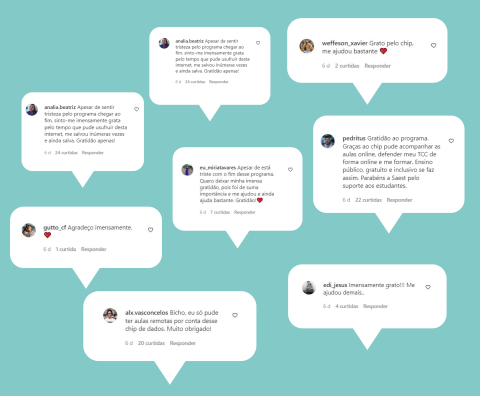Alunos Conectados: technology enabling access to knowledge
What could represent an interruption of the dream of thousands of students of the Federal Institutions of Higher Education (Ifes) and institutions of the Federal Network of Professional and Technological Education linked to the Ministry of Education (MEC) ended up becoming a renewal of hope for a better future based on education and the absorption of knowledge. This is how we can describe the most chaotic period of the pandemic for students in a situation of socioeconomic vulnerability who gained access to the internet, through chips with mobile data packages, delivered by the Alunos Conectados project, which will be closed on 6/30 after reaching its goals.
In addition to enabling students to continue their academic activities remotely, the project contributed to the democratization of access to education, boosting digital inclusion and reducing inequalities in access to Information and Communication Technologies (ICTs), mainly in areas further away from the big centers, where the internet offer is still incipient.
Fundamental for education
The importance of Alunos Conectados was endorsed by the result of the satisfaction survey carried out by RNP, which heard the students themselves and followed the parameters of the Net Promoter Score (NPS) methodology. Among the 573 respondents, 389 rated the performance of the project with a score of 9 or 10, with 10 being the maximum score. The project was considered "very good", within a scale that went from "poor" to "excellent", with 57.59% approval.
Another evidence that reinforces the relevance of the initiative is the number of times its extension was requested by the Secretariats of Higher Education (Sesu/MEC). Check out the timeline below!
The protagonists
Focus of the initiative, the students contemplated were able to enjoy the benefits that mobile data package chips provide with remote internet access during social isolation, during the period when educational institutions remained closed due to the pandemic. Check out some testimonials!

They spoke on social media
Alunos Conectados was also the subject of social media and some students who were awarded left their comments of thanks for having had the opportunity to access the internet in such a complicated period.

RNP’s role
Sponsored by MEC, the project was carried out by RNP, from the idealization of the business model and making calls for contracting suppliers, to the logistics of delivering the chips to the Ifes and institutions of the Federal Network of Professional and Technological Education all over the country.
“RNP accepted the challenge of modeling and developing the Connected Students project with MEC, at such a difficult time for public higher education and with the necessary speed to guarantee access to content for students spread across the country who most needed it, when institutions shifted to fully virtual teaching. After almost two years in execution, we can assess that, in addition to the economy generated and the scale of coverage of the service, the main benefit concerns the positive impacts brought to students in the most distant regions of the country, guaranteeing and democratizing the right to quality public education. The lessons learned from this project will also continue to encourage new public policies that will benefit the education ecosystem”, highlights the Director of Services and Solutions at RNP, Antônio Carlos Fernandes Nunes.
In all, RNP was responsible for delivering more than 165 thousand chips to 101 institutions spread across the 27 federative units. Check the number of chips per region!
MEC vision
Responsible for conducting the project, the Higher Education Secretariat (Sesu/MEC) and Professional and Technological Education (Setec/MEC) were able to closely monitor the entire planning and execution process and consider the initiative a reference for new actions that may be implemented, due to the benefits provided to students at such a critical time.
“The challenging scenario of the outbreak of the pandemic and the coping with health and social adversities required an immediate response and innovative solution, which were consolidated in the successful experience of Alunos Conectados, with around 170,000 students benefiting, 84,000 of them from Federal Universities. In this sense, the efforts of higher education institutions to replace face-to-face classes with digital platforms and distance learning methodologies were indispensable, as well as the efforts of MEC and RNP in providing access and inclusion through the use of Information and Communication Technologies (ICTs) by students of Universities and Federal Institutes. The program allowed students to access and develop their academic activities remotely, in order to reduce the negative impacts arising from the social distancing caused by the pandemic, minimizing dropout, contributing to socio-digital inclusion and maintaining the quality of higher education. Now in its final phase, Alunos Conectados is an important public policy, designed to overcome present and future challenges by promoting democratic and inclusive higher education in the Brazilian context”, emphasizes the Secretary of Higher Education (Sesu), Wagner Vilas Boas de Souza.
The Secretary of Professional and Technological Education (Setec), Tomás Dias Sant'Ana, also highlights the important boost in the democratization of access to information promoted by the project during the almost two years of execution.
“We will close the Connected Students project with the certainty that it was an extremely relevant action, which fulfilled its purpose by contributing to the access, permanence and success of our students in this period of countless challenges, which was the pandemic. One of MEC's priorities was to maintain teaching activities, and among the needs identified, we worked to guarantee access to the internet, especially for students in situations of social vulnerability. In this sense, more than 81,000 chips were distributed to students of the Federal Network of Professional, Scientific and Technological Education (RFEPCT). Thus, we understand that, more than allowing the continuity of academic activities remotely, the project directly contributed to democratize access to education, promoting digital inclusion through Information and Communication Technologies (ICT). The triggering event for this project ends here with the return to face-to-face activities. However, aware that the demand for connectivity remains beyond the pandemic, the MEC will evaluate new possibilities to support this and other demands involving institutions”.
Sustainable from start to finish
From the beginning, the essence of Alunos Conectados was to renew the dream of thousands of students who faced great difficulties or simply did not have the possibility to follow academic activities remotely during the most acute period of the pandemic. And it will be maintained until the end of the project.
RNP is supporting institutions in the process of returning chips that were not collected by students at their institutions and that are in their possession, in a sustainable action that provides for the forwarding of chips that would be discarded for recycling.
Seed that has germinated
The experience acquired by RNP throughout the complex project execution process is already generating results that will be harvested, this time, by the country's basic education students. The organization was summoned by the Ministry of Communications (MCom) to implement the Internet Brazil Program.
The initiative, instituted by presidential decree and which was sanctioned as law 14.351/2022 at the end of May, will deliver, free of charge, mobile broadband chips to thousands of basic education students from the public school network registered in the Single Registry for Social Programs of the Federal Government (CadÚnico).
“The opportunity to conduct the Alunos Conectados project enabled RNP to both exercise its mission of supporting education and research at a critical moment (during the pandemic), using technology to bring people closer together even while maintaining distance, and to internally provoke learning to expand presence using Personal Mobile Service (SMP). This brought know-how to the organization that is now helping to build the Internet Brazil Project”, says the Solutions manager, Hélder Vitorino, responsible for the two initiatives at RNP.
An integral part of MCom's Internet Brazil Program, the Internet Brazil Project will be gradually implemented by RNP, with the first phase being the Proof of Concept (PoC) for up to 10,000 students, which intends to distribute chips with data service (internet) in six municipalities in the Northeast. It is important to point out that eSIM Cards will be used, which makes it possible to change providers remotely without the need to distribute new SIM cards.